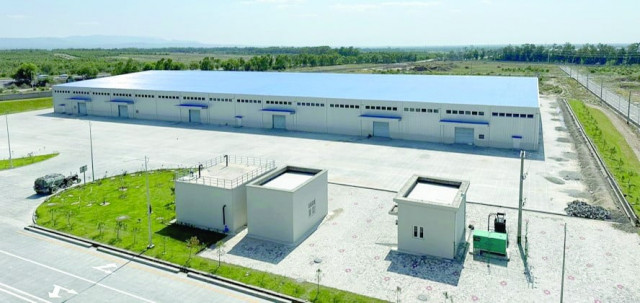Rashakai SEZ to help spur economy
Project development will generate lots of job opportunities, high-scale investment

Rashakai Special Economic Zone (SEZ) Director of Utilities Ashraf Orakzai starts his work early in the morning in this industrial estate in Khyber-Pakhtunkhwa (K-P) no matter how tough the weather is since he considers his job crucial for Pakistan's future.
Orakzai, who belongs to K-P and has been working at Rashakai SEZ and the industrial park, part of the China-Pakistan Economic Corridor (CPEC) framework, since mid-2022, is highly motivated towards the development of this project as it is going to generate a lot of employment opportunities along with high-scale investment and economic activity not just in his own province but the entire country, Xinhua news agency reported.
Launched in 2013, CPEC, a flagship project of the China-proposed Belt and Road Initiative, is a corridor linking the Gwadar Port in southwest Pakistan's Balochistan province with Kashgar in northwest China's Xinjiang Uygur Autonomous Region, which highlights energy, transport, and industrial cooperation in the first phase, while in the new phase expands to the fields of agriculture and livelihood, among others.
"As a Pakistani, we all want our country to develop and progress, and such projects, I believe, would play a defining role in economic development and specifically in poverty alleviation," he said.
The SEZ has a complete infrastructure of more than a dozen individual buildings, seven km of roads, and a variety of complete network facilities, including water, drainage, power supply, and communication.
Invested and implemented by China Road and Bridge Corporation (CRBC), the project is divided into three phases, covering a total area of around 1,000 acres.
The first phase, covering an area of 247 acres, was implemented from June 2021 to March 2023, in which over 60% of land has been leased out, mostly, to Pakistani and Chinese enterprises.
There are 10 different types of industries under construction in the zone, including steel, pharmaceutical, surgical and mobile accessories' factories, Orakzai told Xinhua. Rashakai, as CPEC's first SEZ, is positioned to vigorously promote the next step of industrial cooperation between Pakistan and China under CPEC, said Wu Yuxing, Project Manager of CRBC at Rashakai.
All infrastructural facilities are designed according to Chinese standards, including the establishment of a complete operation support team, he said.
"At the same time, the overall scale of the park and subsequent operation and maintenance, and services for the entire industrial chain of enterprises are also of top quality," he added.
The zone is located around 90 km from the federal capital, Islamabad, and nearly 60 km from Peshawar, the provincial capital of K-P, which brings the two major cities within reach of one to two hours. A motorway, railway network and Afghan port are also within its vicinity. Orakzai said one of the things specifically focused at Rashakai was the ease of doing business, adding "we have a one-window operation facility with all the relevant departments as well as a facilitation centre."
Javed Iqbal Khattak, Chief Executive Officer of K-P Economic Zones Development and Management Company, a partner of Rashakai SEZ management, said that four new industries, including medicine, sulphuric acid, electric cables and pharmaceuticals, are expected to start operations this year.
Negotiations have almost been finalised with an electric bike and scooter manufacturing company of young engineers as well, and they are also expected to join later on, he said. These industries will act as a catalyst to attract others, Khattak added. He said the SEZ focuses on promoting export-oriented and import-substitution industries, which would impact Pakistan's overall economy.
"As per the agreement, 80% of employment will be given to the locals, which will be a big boost to the development of K-P," Khattak said.
The local industry will get a chance to learn best practices in the manufacturing sector from the well-established multinational corporations, he said, adding that K-P's local vendor industry, most importantly, will flourish with the development of Rashakai.
SEZs are significant for industrial development in a country in today's world, said Syed Wajid Bukhari, CEO of the Pakistan Association of Large Steel Producers, which has member companies of the Pakistan Business Council and the country's largest private-sector businesses and conglomerates including multinationals.
Rashakai is very important symbolically as well because its success would send a good message to foreign investors, he said.
"This development will be a positive signal for CPEC since industrial development was one of the main targets of CPEC for which massive infrastructure was developed in its first phase," according to Bukhari.


















COMMENTS
Comments are moderated and generally will be posted if they are on-topic and not abusive.
For more information, please see our Comments FAQ